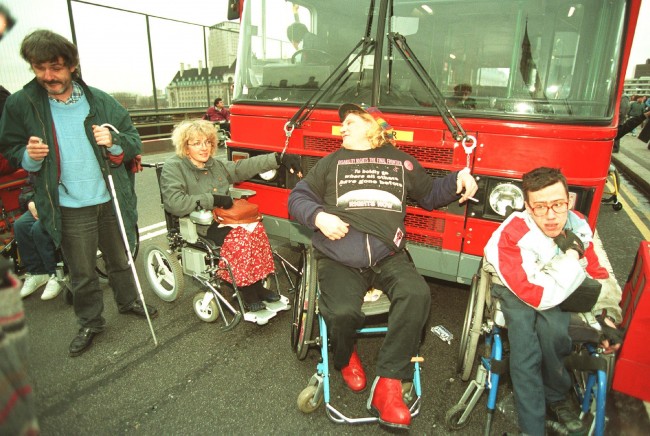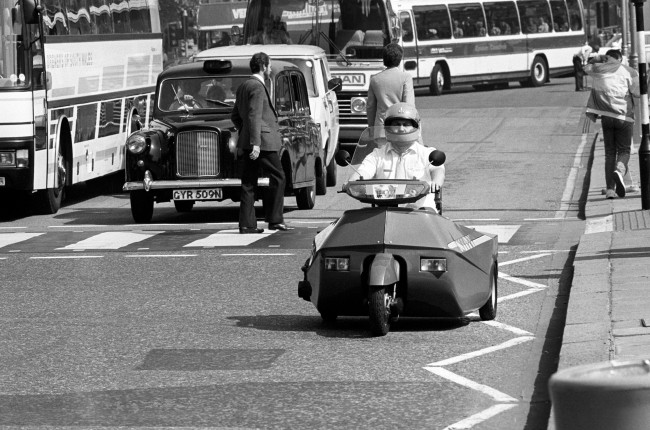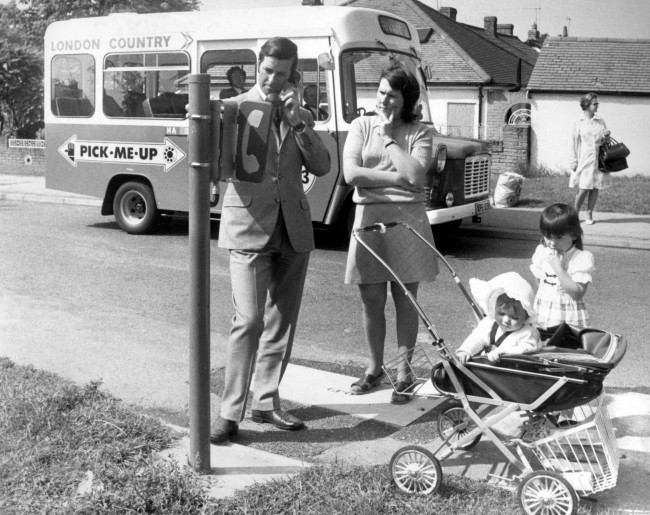Wheelchairs And Prams Fight For A Fair Service On The Bus

Disabled rights demonstrators chain themselves to a double decker bus on London’s Westminster Bridge. The action coincided with a mass lobby of Parliament to demand that MP’s support the latest Bill to give disabled people rights under the law.
Date: 09/02/1995
WHO has right of way on a bus: wheelchairs or pushchairs? No contest surley. Wheelchairs must win. Children can be carried. Unless you’re on an ATOS bus in which case the wheelchair user can bloody well walk:
A court will decide whether wheelchair users have priority over pushchairs on buses, but how do you decide who is more entitled to the space? In February 2012, wheelchair user Doug Paulley was not allowed to board a bus in Leeds because the wheelchair space was taken by a pushchair. The mother, not wanting to wake her sleeping baby, refused to move.
Paulley was left with no choice but to get off and wait for the next bus. That one was an hour away, and took him to the wrong side of the city. It was the straw that broke the camel’s back. “That day in February resulted in me not using a bus again for a year. I lost all confidence and couldn’t face it anymore,” he said last year.
It sounds like the bus service is at fault: not enough space.
But the law says disabled people are a “protected group” under the Equality Act 2010.
A person (A) discriminates against a disabled person (B) if A treats B unfavourably because of something arising in consequence of B’s disability…
Parents with young children are not a protected group.
Back in 2012, First Bus, the company in charge of the bus Paulley tried to get on, had a “first come, first served” policy that meant the driver could ask the woman to move, but could not force her. It relied on the goodwill of passengers to give up their spot for a wheelchair user, and as became evident, this reliance was open to failure.
Paulley was so upset by the experience that he embarked on an 18-month legal battle against First Bus, a case he eventually won. A judge at Leeds County Court ruled in September last year that First Bus’s policy of “requesting but not requiring” non-disabled travellers to move was unlawful discrimination, in breach of the Equality Act 2010.
Had the next bus arrived faster, things would have been fine. So, again, the fault lies with teh bus service and the vehicle’s design.
First Bus have appealed that decision, and it has reached the Court of Appeal. They are arguing that they made reasonable adjustment to allow wheelchair users access by providing the bays, and that it was not a requirement for the driver to move the mother.
They want legal clarity on whether this should be a driver’s role. It is a precedence setting case that, if First Bus lose, would result in drivers having a legal requirement to move people from that bay if a wheelchair user needs it, and it would stretch further too, for all bus companies and trains across England and Wales.

Mike Barnes, of Derby rides around Parliament Square in his invention the ‘Nippi’ motorbike, designed for the disabled. The bike is designed to take both rider and wheelchair.
Date: 17/07/1984
Bus firm EYMS says police can be called:
“…the space is there for disabled passengers and we are telling our drivers they must intervene if a person with a pushchair does not move for a disabled passenger. Drivers must ask them to move.If the passenger refuses to move, the advice is call the police. But we really don’t want to go down that line unless we really have to.”
It used to be better:

A rehearsal for a new form of public transport takes place in Harlow, Essex. Irene Read learns how to operate the system, which involves five 16-seater buses available between 7am and 11pm. Free telephones are installed in strategic places for passengers to ask for a bus to be routed within minutes to pick them up at home.
Date: 28/08/1974
Posted: 13th, November 2014 | In: Reviews Comment | TrackBack | Permalink


